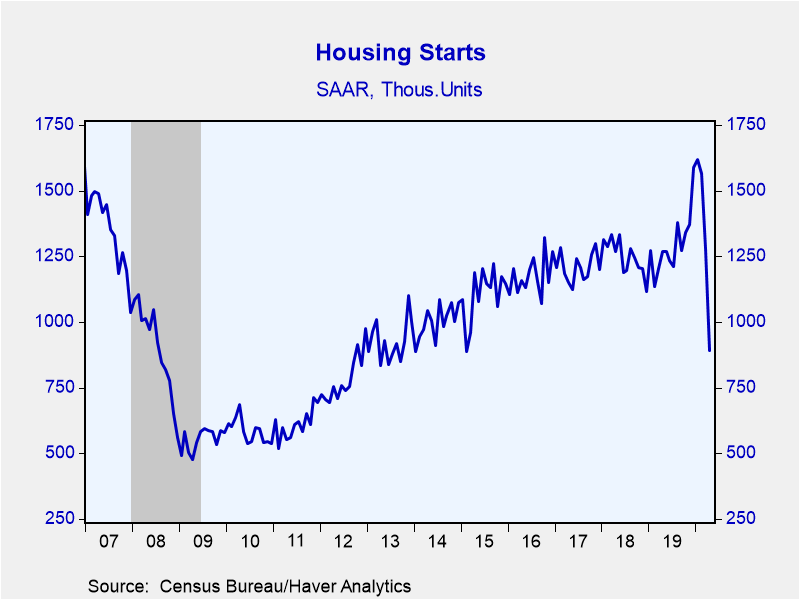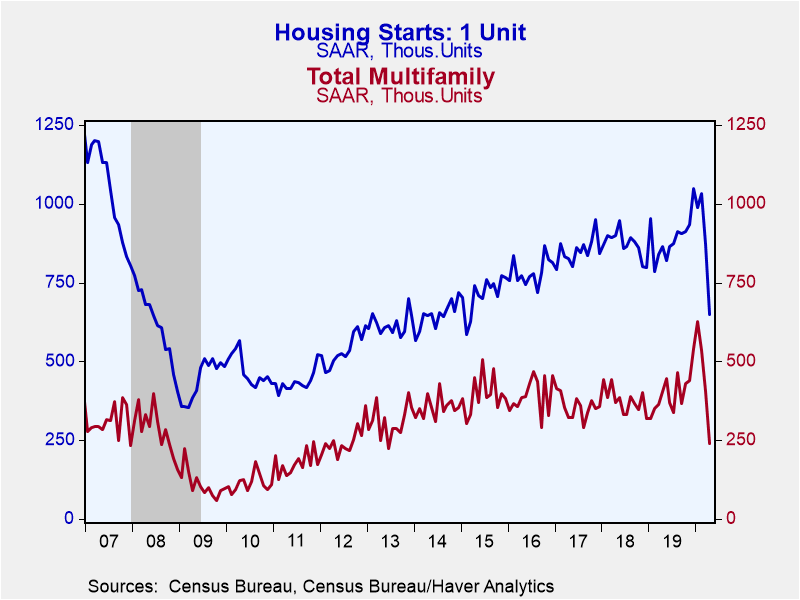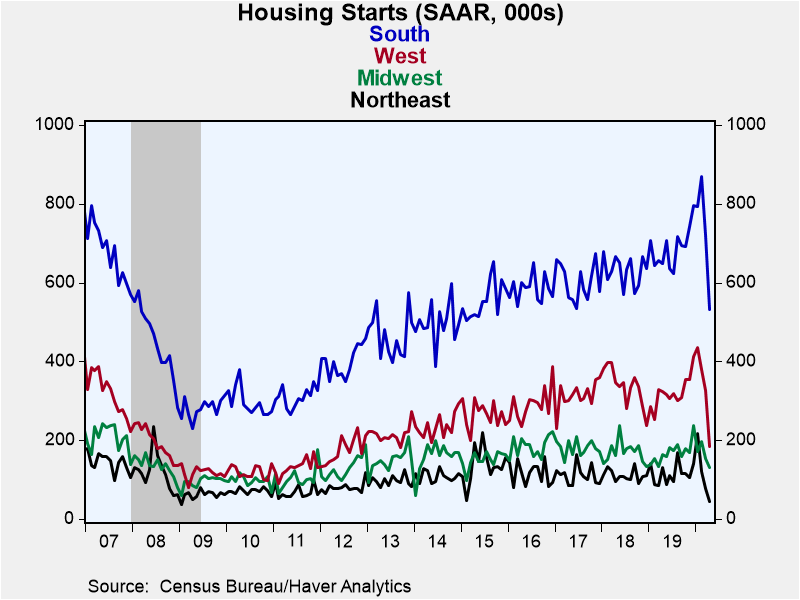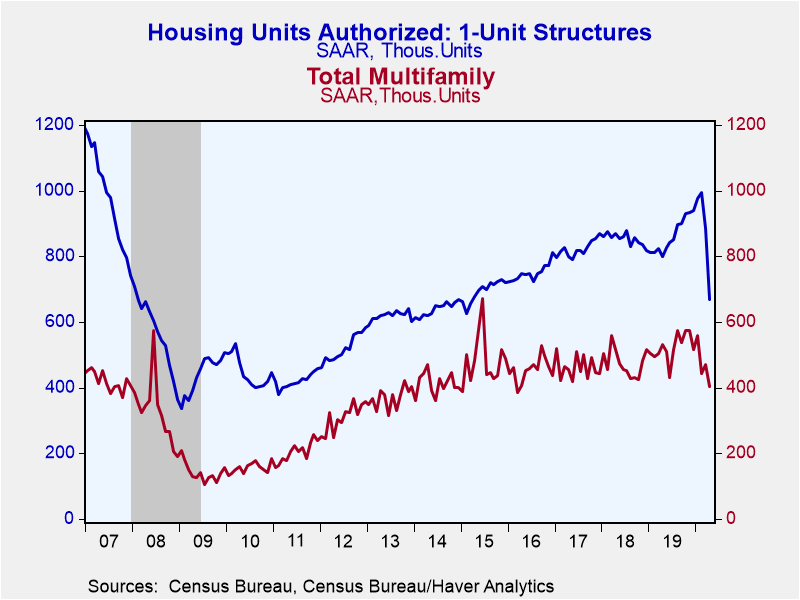 Global| May 19 2020
Global| May 19 2020U.S. Housing Starts Post Record Decline in April
by:Tom Moeller
|in:Economy in Brief
Summary
• Housing sector continues under pressure due to coronavirus shutdowns. • Starts decline to five-year low. • Falling permits suggest more weakness to come. New residential home building continues to weaken dramatically. Housing starts [...]
• Housing sector continues under pressure due to coronavirus shutdowns.
• Starts decline to five-year low.
• Falling permits suggest more weakness to come.
New residential home building continues to weaken dramatically. Housing starts declined 30.2% (-29.7% y/y) during April to 891,000 (AR) from 1.276 million in March, revised from 1.216 million. Total starts are 43.9% below their January peak. The latest level was the lowest level of starts since February 2015. The Action Economics Forecast Survey expected 930,000 starts for April.
Starts of single-family starts declined 25.4% (-24.8% y/y) to 650,000 last month following a 15.8% March shortfall. It also was a roughly five-year low. Multi-family starts fell 40.5% (-40.2% y/y) to 241,000, the third straight month of sharp decline.
A 20.8% decline (-19.2% y/y) in building permits to 1.074 million units followed a 5.7% March drop. Permits to build single-family homes fell 24.3% (-16.4% y/y) to 669,000, five-year low. Permits to build multi-family dwellings fell 14.2% (-23.6% y/y).
By region, last month's weakness in starts reflected a 43.6% decline (-66.4% y/y) in the Northeast to 44,000. It followed similar declines in each of the prior two months. Starts in the West weakened 43.4% (-43.2% y/y) to 184,000 and added to the 14.5% decline in March. In the Midwest, housing starts fell 14.9% (-20.1% y/y) to 131,000, the third decline in four months. In the South, starts decreased 26.0% (-17.9% y/y) to 532,000 after falling 17.3% in March.
The housing starts and permits figures can be found in Haver's USECON database. The expectations figure is contained in the AS1REPNA database.
Coronavirus and CARES Act from Fed Chairman Jerome H. Powell is available here.
| Housing Starts (000s, SAAR) | Apr | Mar | Feb | Apr Y/Y % | 2019 | 2018 | 2017 |
|---|---|---|---|---|---|---|---|
| Total | 891 | 1,276 | 1,567 | -29.7 | 1,298 | 1,250 | 1,209 |
| Single-Family | 650 | 871 | 1,034 | -24.8 | 894 | 873 | 852 |
| Multi-Family | 241 | 405 | 533 | -40.2 | 404 | 377 | 357 |
| Starts By Region | |||||||
| Northeast | 44 | 78 | 121 | -66.4 | 116 | 111 | 111 |
| Midwest | 131 | 154 | 197 | -20.1 | 170 | 171 | 181 |
| South | 532 | 719 | 869 | -17.9 | 689 | 631 | 603 |
| West | 184 | 325 | 380 | -43.2 | 322 | 337 | 314 |
| Building Permits | 1,074 | 1,356 | 1,438 | -19.2 | 1,350 | 1,330 | 1,286 |
Tom Moeller
AuthorMore in Author Profile »Prior to joining Haver Analytics in 2000, Mr. Moeller worked as the Economist at Chancellor Capital Management from 1985 to 1999. There, he developed comprehensive economic forecasts and interpreted economic data for equity and fixed income portfolio managers. Also at Chancellor, Mr. Moeller worked as an equity analyst and was responsible for researching and rating companies in the economically sensitive automobile and housing industries for investment in Chancellor’s equity portfolio. Prior to joining Chancellor, Mr. Moeller was an Economist at Citibank from 1979 to 1984. He also analyzed pricing behavior in the metals industry for the Council on Wage and Price Stability in Washington, D.C. In 1999, Mr. Moeller received the award for most accurate forecast from the Forecasters' Club of New York. From 1990 to 1992 he was President of the New York Association for Business Economists. Mr. Moeller earned an M.B.A. in Finance from Fordham University, where he graduated in 1987. He holds a Bachelor of Arts in Economics from George Washington University.
More Economy in Brief
 Global| Feb 05 2026
Global| Feb 05 2026Charts of the Week: Balanced Policy, Resilient Data and AI Narratives
by:Andrew Cates










